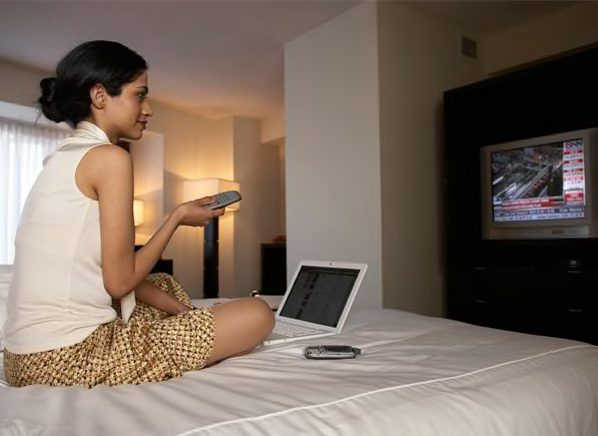Sign In

Menu
Suggested Searches
Recent Searches
Suggested Searches
Product Ratings
Resources
Chat With AskCR
Resources
All Products A-ZThe payment for your account couldn't be processed or you've canceled your account with us.
Re-activateMy account
Sign In
My account
Sign In


Summer travel often includes several relaxing nights at a hotel. But if you're not careful, you could be the victim of creative hotel scams that con artists have come up with to steal your money or your identity.
The Federal Trade Commission recently wrote about scams targeting hotel guests. Another warning comes from the Secret Service and Department of Homeland Security. Here's a rundown of these schemes.
Avoid it. Don't provide billing information over the phone. Go to the front desk to discuss the problem, if there really is one.
A flyer for pizza delivery appears under your hotel door. You call to place an order and provide your credit card info. Your promised pie never arrives, and the scammer now has your credit info.
Avoid it. Make sure the restaurant is legit before calling by checking with the front desk or confirming the restaurant's information online. Insist on paying on delivery.
Planning to travel? Check out our hotel buying guide and find the right suitcases with our luggage buying guide.
When you search for wireless networks on your own computer or mobile device, you find one with the name of the hotel or something similar. Unfortunately the network doesn't belong to the hotel at all, but to a scammer out to steal information it intercepts over the rogue connection.
Avoid it. Ask the hotel for details on how to identify and access any wireless network available to guests. But even then, use caution. You never know when any public Wi-Fi hotspot is being used to gather user information.
This is another scam aimed at collecting your personal information from a computer. A recent alert from the U.S. Secret Service and Department of Homeland Security warns about scammers installing so-called keylogging software on computers in hotel business centers, which visitors use to access computers and the Internet, among other things.
According the the website Krebs on Security, which revealed the non-public alert, officials warned that the "suspects were able to obtain large amounts of information including other guests personally identifiable information (PII), log in credentials to bank, retirement and personal webmail accounts, as well as other sensitive data flowing through the business center's computers."
Avoid it. Always be careful when using public computers at hotels, libraries, and elsewhere. Assume that everything you type is being recorded by someone out to use the data for nefarious purposes.
—Anthony Giorgianni
 Build & Buy Car Buying Service
Build & Buy Car Buying Service
Save thousands off MSRP with upfront dealer pricing information and a transparent car buying experience.
 Get Ratings on the go and compare
Get Ratings on the go and compare
while you shop